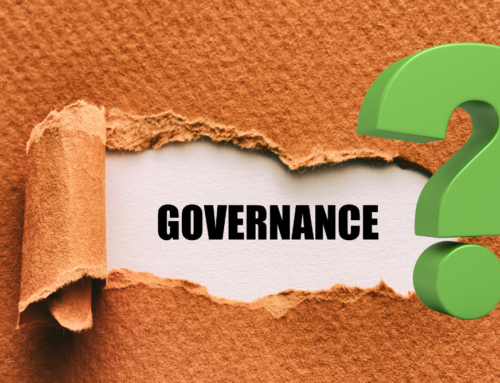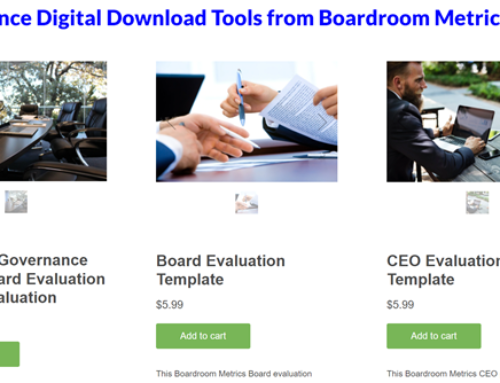“My play was a complete success. The audience was a failure.” ~ Ashleigh Brilliant
Board governance is frequently discussed and deliberated usually from many different perspectives. Do you see it from the stage looking down or from the seats looking up? Often governance is misunderstood. In my next two blogs, I would like to offer an insider’s perspective on the topic of vantage point, and where you look at Governance from.
Over the years, I have had the privilege of serving on a number of boards, as well as being chair of a national children’s charity, been the head of the audit committee for a Global charity and acted as a Trustee for a faith-based organization. I have also observed dozens of boards from outside the boardroom (public and private) and engaged in numerous confidential conversations with members of these boards about the challenges they faced and how they handled them.
 In surveying governance through the lens of different roles, I hope to give the perspective of someone who has seen boards from within and through the giant glass door.
In surveying governance through the lens of different roles, I hope to give the perspective of someone who has seen boards from within and through the giant glass door.
Governing boards in the for-profit and nonprofit frameworks share many legal principles: the oversight role, the decision-making power and their members’ or stakeholders fiduciary duties.
Your duty of is one of care; that an ordinarily prudent person would exercise in a like-position and under similar circumstances. However, it goes beyond what your legal responsibilities are.
Be an advocate for sound governance – Be independent of thought
Independent directors should be advocates—and enforcers—of sound governance principles. This is especially important in challenging times or when the company or non-profit is in crisis. Too many directors accept board governance as it is, without suggesting the kinds of process improvements that would make a difference; some directors even resist them. Board independence and board attention are of overriding importance in good governance.
Misconceptions about corporate governance abound. It’s no surprise when failure at the board level happens, inevitably the media or the status quo point to the formal board processes and “check the box” criteria that generally have little to do with the substance of how boards operate. The combination of new governance regulations and rising expectations makes serving as an independent director much more important—and difficult—than it was in years past. The greatest challenge these directors face is to stay fully informed about the business of the company or the mission of the non-profit for whose board they are sitting on.
Role 1: The Independent Director
Information irregularity is often at the root of this challenge. When directors are truly independent of the companies they serve, they generally lack the wealth of knowledge about the industry, business or non-profit that their senior-executive counterparts have. Consequently, management has far more information than independent directors can ever absorb. I recall this challenge with regards to the change of an accounting system with a new software package. Not having done an integration or a conversion personally, who was I to know how long it should take. Whether or not my questions helped nudge management in this direction, I strongly believe that independent directors can provide leadership and contribute to the companies they serve in ways that go beyond meeting the basic legal requirements and fiduciary responsibilities inherent in board service. In addition to asking tough questions says you are doing your job as a director.
Yet process matters hugely in the boardroom, and not just to make sure a company abides by governance rules. Process steps help to keep board members engaged and able to fulfill their responsibilities and, more important, establish the proper balance of power between management and the board.
Perhaps the most useful aspect of the governance is the requirement for independent directors to meet “in camera” or as some call it, in executive session without the CEO or President in attendance. These sessions give directors the opportunity to share concerns about the company or the non-profit and to ask for improved governance steps or additional reviews. They are also a time to discuss privately any concerns that directors have about management and to ensure that directors are fully informed. Finally, the sessions are useful in building chemistry among the independent directors. Never under estimate the value of good chemistry.
Role 2: Leading in Crisis
The real test of a board of directors comes when the company is in crisis. Independent directors, in particular, are counted upon to step up to their responsibilities in difficult times. Their accumulated wisdom and judgment are crucial to make sound decisions under the pressure of time and media attention.
The overarching lesson I have distilled from the crises I’ve seen, I’ve studied and watch unfold before me through the media are that board members need to understand and trust each other. Only when they can have candid conversations will they ultimately reach a consensus that has positive and far-reaching implications for the company. Trust becomes even more important when meetings are conducted by telephone, which is often the case in crises. Again, this points towards the right chemistry.
The bottom line for independent directors is that their responsibilities and obligations are so great these days that they cannot serve on a board and expect to preside while fulfilling only the minimum requirements. Rather, independent directors must be fully engaged, do their best to learn the business or the mission and stay connected between meetings. Otherwise, they won’t be prepared to lead when a crisis hits.
Role 3: Sharing Their Skills and Experience
Oscar Wilde said “Experience is what we call our mistakes”.
To be independent and providing leadership for a director comes from having qualities that usually come from real life experiences or from experience. In my career both in the board world and the financial services world, I have faced situations that my experience helped me make the correct decision. It came from listening, it came from watching others and it came from being properly informed. One of the best directors I saw would frame a problem from a number of different ways but without telling what his or her bias. This gave others perspective and encouraged discussion by all members. It was rare that we ever had circumstances where “group think” would lead us to the wrong decision.
Informed judgment is the ability to focus on the important issues and base decisions and actions on sound principles and common sense. Most of the time in the past, it was just common sense that we relied upon. But with complex rules, regulations and constant changes to these rules/regulations, you need experience. We are in an environment when the media can challenge your abilities as a board based sometimes on misinformation. Someone once said to me that you can build a reputation over 30 years but it can be wiped out in 30 minutes.  There are many Boards who have seen hits to their reputation over the since the great Global Financial Crisis that took place in 2008.
There are many Boards who have seen hits to their reputation over the since the great Global Financial Crisis that took place in 2008.
A dynamic board is one that will build or enhance its self by self-assessment usually annually or bi-annually. It is as important to know what the skills, experience and knowledge of its members are and what it may need going forward.
Reflections
There are multiplicities of perspectives that board members can bring to the role that can strengthen the organizations they serve. How can you make the most of it? Here are three suggestions.
- The board should acknowledge that no single structure works in all cases. Boards must be pragmatic enough to adapt to the individuals involved rather than put a rigid structure in place.
- All parties, but especially CEOs, should acknowledge different points of view and work to minimize the conflicts that inevitably arise from them. This requires high-level listening skills, the ability to see situations from the other person’s perspective, and the wisdom to understand the basis for the different points of view.
- All directors, but especially CEOs, can benefit from holding different positions, either within the company or on other companies’ boards. Nominating committees should seek out prospective board members with diverse experiences. Boards should also encourage CEOs to serve on at least one outside board to give them the experience of being an independent director and seeing firsthand the challenges outside directors’ face.
If these basic guidelines are followed, board governance will improve markedly. As a result, companies and non-profits will have a steady hand in the boardroom to sustain their achievements through successive generations of leadership and board membership.
In my next blog, I will share with you how truly showing independence will separate you as a board contributor in times of conflict and in times of crisis. I will share with you how it will enhance decision making with your colleagues.







Leave A Comment